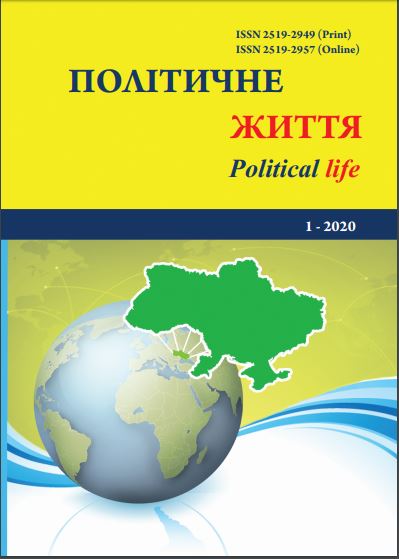Trends of the interaction between the power and the opposition in Poland in the context of democratization processes.
DOI:
https://doi.org/10.31558/2519-2949.2020.1.1Keywords:
Poland, power, opposition, political parties, social capitalAbstract
This article substantiates theoretical and methodological approaches regarding the impact of the power-opposition interrelations on strengthening and weakening of democracy. Based on the analysis of a number of indicators and modern political process in Poland, it has been established that democratization takes place against the backdrop of the permanent formation and preservation of two opposed poles in the political field. Deflection from democracy increases the distance between two competing/conflicting parties – pro-government and opposition, this automatically accumulates the potential of pole's force. Therefore, the interrelations between the power and the opposition turn into the force of stratification and equalization, which allows to reduce the "democracy deficit" and bring the political system into the state of equilibrium.
The increase of the distance between the power and the opposition is accompanied by the dissemination of opposing approaches to current topics in the political discourse, which are spread through social networks and in the long run allow to polarize the active part of the electorate and provoke political absenteeism in the other part of the electorate. In the context of democracy, this effectively leads to minority rule over the majority, potentially threatening the crisis of liberal democracy.
The analysis of the development of social capital in Poland has shown the low level of trust of Poles in public institutions, including those in power, lack of sense of community, preference for individual relations, lack of common approaches to the development of competences. One of the reasons for this phenomenon may be the informatization of a society that relies on individualism, as in the process of technological development, interpersonal contacts are becoming more virtual and shallow. Suchlike "network relations", although unlimited in number, are devoid of the reality. On the other hand, it gives political parties the possibility to implement virtual projects, bypassing institutions of civil society (macrolevels) that have proved to be ineffective, to quickly penetrate at the individual level (micro-levels) and through communication channels to convert social capital into political and economic. This game into virtual democracy has absolutely opposite consequences for democratic consolidation, reinforcing the asymmetry of social perception of democratic reforms, political absenteeism, and individualism.
References
Skrzypiński D., Solarz R. Włada ustawodawcza. System polityczny Rzeczypospolitej Polskiej / red. H. Lisicka. Wroclaw: Biuro doradztwa ekonomicznego, 2005. S. 213 – 225.
Sula P. Post-communist parties in Poland after 1989. Communist and Post-Communist Parties in Europe / ed. U. Backes, P. Moreau. Göttingen: Vandenhoeck & Ruprecht, 2008. P. 311–338.
Романюк А., Литвин В. Порівняльний аналіз політичних інститутів країн Вишеградської групи та інших країн Центрально-Східної Європи. Львів : ЛНУ імені Івана Франка, 2016. 548 с.
Сула П. Політична опозиція в Польщі після 1989 р. Трансформація в Польщі і в Україні. Вибрані аспекти / ред. А. Антошевського, А. Колодій, К. Ковальчика; пер. Л. Гурська-Ковальчик. Вроцлав: Wrocławskie Wydawnictwo Oświatowe, 2010. С. 571 – 583.
Сорокин П. Главные тенденции нашего времени. Москва: Директ-Медиа, 2007. 416 с.
Сорокин П. Человек. Цивилизация. Общество / ред. А. Союмонов; пер. с англ. С. Сидоренко. Москва: Политиздат, 1992. 543 с.
Tyrała M. Konsolidacja demokracji w Polsce w latach 2006 – 2017. Studia Politicae Universitatis Silesiensis. 2019. T. 25, S. 67 – 81. URL: https://doi.org/ 10.31261/SPUS.2019.25.03 (дата звернення 11.01.2020).
BTI. Country Report. Poland. 2018. URL: https://www.bti-project.org/ en/reports/country-reports/detail/itc/ pol/ity/2018/itr/ecse/ (дата звернення 15.01.2020).
Corruption Perceptions Index / Transparency International. URL: https://www.transparency.org/ research/cpi/overview (дата звернення 15.01.2020).
How corruption weakens democracy / Transparency International. URL: https://www.transparency.org/ news/feature/cpi_2018_global_analysis (дата звернення 22.12.2019).
Strategia rozwoju kraju 2007 – 2015. Warszawa: MRR, 2006. 60 s. URL: http://pkpplewiatan.pl/upload/File/plik/Strategia_Rozwoju_Kraju.pdf (дата звернення 20.12.2019).
Czapiński J. Kapitał społeczny. Diagnoza społeczna 2007. Warunki i jakość życia Polaków. Raport / red. J. Czapiński, T. Pank. Warszawa: Rada Monitoringu Społecznego, 2007. S. 257 – 267. URL: http://www.diagnoza.com/pliki/ raporty/Diagnoza_raport_2007.pdf. (дата звернення 20.12.2019).
Żukowski T., Theiss M., Obywatele wśród krewnych i znajomych: stowarzyszeniowo-obywatelski kapitał społeczny i jego związki z kapitałem rodzinnym oraz sąsiedzko-towarzyskim. Życie po zmianie. Warunki życia i satysfakcje Polaków / red. K. Zagórski. Warszawa: Wydawnictwo Naukowe Scholar, 2009. s. 63 – 96.
Przewłocka J. Polskie organizacje pozarządowe 2012. Stowarzyszenie Klon/Jawor. Warszawa, 2013. URL: http://civicpedia.ngo.pl/files/ civicpe dia.pl/public/FaktyNGO_brosz1.pdf (дата звернення 02.12.2019).
Zaufanie w sferze prywatnej i publicznej a społeczeństwo obywatelskie. 2006. Komunikat nr. 3480 / CBOS. URL: https://www.cbos.pl/PL/ (дата звернення 02.12.2019).
European Social Survey 2010. URL: http://nesstar.ess.nsd.uib.no/ webview/index.jsp?v=2&submode=abstract &study=http%3A%2F%2F129.177.90.83%3A80%2Fobj%2FfStudy%2FESS5e03.4&mode=documentation&top=yes (дата звернення 03.12.2019).
Strategia rozwoju kapitału społecznego 2020. Komitet Stały Rady Ministrów. Warszawa, 2013. 90 s. URL: http://ks.mkidn.gov.pl/ media/download_ gallery/20130520SRKS_na_stronie_internetowej.pdf (дата звернення 02.12.2019).
Czapiłski J., Sułek A., Stan społeczełstwa obywatelskiego. Diagnoza społeczna 2011. Warunki i jakość życia Polaków. Raport. URL: http://analizy.mpips.gov.pl/ images/stories/publ_i_raporty/Raport_Glowny_2011_ pop_INTERNET.pdf (дата звернення: 08.06.2016).

